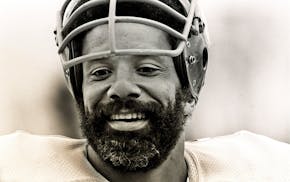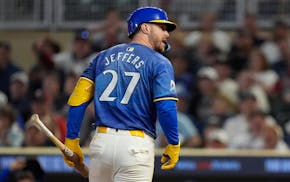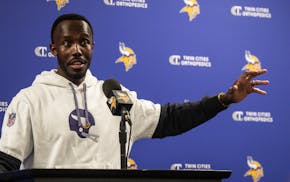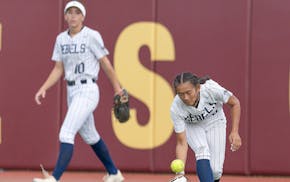Major League Baseball's offseason does not officially begin until the World Series concludes, but the Twins made a big move Tuesday.
The Twins announced they will have their TV broadcasts produced and distributed by the league next season. MLB handled the broadcasts for three teams this year, which included availability on cable and satellite providers along with a cord-cutters' streaming option.
The announcement ends the Twins' relationship with Diamond Sports Group, Bally Sports North's parent company, after their contract expired at the end of the season.
"It will eliminate all blackouts as we have come to know and hate them," Twins CEO Dave St. Peter said. "It will propel us into the future with the direct-to-consumer streaming option that our fans have been desperately asking for."
The Arizona Diamondbacks, Colorado Rockies and San Diego Padres had MLB-produced TV broadcasts this year, which included channels on Comcast/Xfinity, Fubo and DirecTV. Games could be streamed online locally for $99.99 per season ($19.99 per month) with no blackouts.
MLB said it will have more information on where to specifically watch Twins games closer to the start of the 2025 season.
"MLB has successfully negotiated distribution in the three markets they've been in over the last two years," St. Peter said. "We expect them to do that in this market. In place of that, if a fan wanted to watch games and subscribe to Twins TV via a direct-to-consumer streaming option, they'll have the ability to do that as well."
The new TV deal does not come with a traditional rights fee — the Twins were paid $54.8 million from Diamond Sports in 2023 — and the Twins are expected to make less money through advertising, distribution fees and streaming subscribers. The Padres were approaching 40,000 digital subscribers in July, according to MLB commissioner Rob Manfred, which amounts to around $4 million.
MLB boasted in its announcement that Twins broadcasts can reach around 4.4 million homes, up from 1.08 million under Bally Sports North.
"We do expect to take a step back in terms of local revenues related to television," St. Peter said. "I think that's a reality. We also understand the expansion of reach and what that will do for our fanbase ultimately, over time, starting to build that direct-to-consumer foundation, which clearly is the future of the way our games will be distributed. It's time to get on with that.
"Our ownership understands the consequences of that. Over time, there is way more upside than there is concern about the short-term downside."
The Twins are not planning a payroll reduction for the 2025 season, and their new TV deal was already a part of their calculations.
"Our ownership spoke on payroll recently and, at that time, they knew the direction we were headed on local television, so I don't think today's announcement has any impact on payroll," St. Peter said.
The Twins bypassed an MLB-produced broadcast prior to the 2024 season, opting to extend their contract for another year with Diamond Sports, a company attempting to chart a path out of bankruptcy. Many cable subscribers were unable to watch Twins games for three months this summer because of a contract dispute between Diamond and Comcast.
Manfred noted in July that MLB-produced broadcasts had a distribution deal with Comcast that did not lead to a blackout.
"The distribution has been there and, frankly, the fan feedback has been really positive," said St. Peter, referencing how it worked for the three teams MLB handled this year. "We felt like clarity for our fans was the most important thing that we could bring heading into 2025, realizing the uncertainty that we've been dealing with."
The Cleveland Guardians and Milwaukee Brewers are joining the Twins for MLB-produced broadcasts next year. All three teams had their TV contracts expire at the end of the regular season. The Texas Rangers announced they are splitting with Diamond Sports and exploring options for next year.
Cory Provus and Justin Morneau are expected to remain as the primary game broadcasters, St. Peter confirmed. It's uncertain how many people from the pregame and postgame shows, along with behind-the-scenes staff, will be a part of the TV broadcasts next year.

Reusse: Marshall never lost his lust for life

Twins open homestand with loss to Blue Jays, Jeffers ejected after critical call

Vikings GM talks to the Star Tribune about the team's 2025 outlook, McCarthy's trajectory

Champlin Park turns a big moment into the Class 4A softball championship
